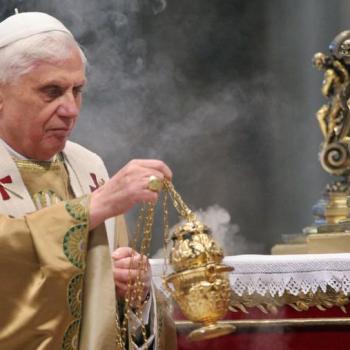Lectionary Reflections: Year A
Seventh Sunday of Easter (or Ascension of the Lord)
June 5, 2011
Psalm 47
Psalm 47 has long been known as an enthronement psalm, perhaps used at the coronation of an earthly king. We, of course, have no way of proving that as a fact, but it is reasonable to assume that when a king of Israel was chosen, his enthronement as king was celebrated with a festival. And where there are Israelite festivals, there are psalms. But there are far more important ideas to be found in this short piece of ancient poetry than a discovery of its possible Israelite use.
This psalm claims something quite remarkable and quite controversial. Verses 1-4 say, first, that YHWH, the Most High, is "a great king over all the earth." One must not pass by such a claim too quickly. Among other things, the claim is deeply political. If YHWH is the great king over all the earth, then no other kings need apply for the job. That means clearly that any form of government can only be provisional and transitory, whether they are democratic or authoritarian. No human government will last forever, whether Sumerian, Egyptian, Babylonian, Assyrian, Greek, Roman, Arab, Catholic, Protestant, European, or American; all these, that at one time or another have announced a kind of eternal authority, will not last. Only God is king over all the earth.
But, second, the psalmist also says "God chose our heritage for us, the pride of Jacob whom God loves" (v. 4). In other words, though YHWH is ruler over all, YHWH at the same time uniquely loves (see Dt. 7:7-8) Israel. Though many have tried to have this conundrum their own way—either God loves Israel especially or God loves the whole earth—both facts are kept here in tension. No one can deny either side of the belief. Israel has a unique role to play in the work of God, but neither Israel nor any other nation, can deny that God loves all at the same time.
This dual nature of God's regard for Israel and the other nations has important implications. YHWH is far more than a tribal, partisan, or sectarian God. Any who would hoard the power and care of this God has refused to recognize the sheer size of the deity. YHWH is far too vast to be confined by any one nation or group of people. But also because YHWH is uniquely connected to Israel, to its storied past in the traditions of Moses and Sinai even before any talk of an earthly temple, it is clear that Israel's faith is profoundly political in formulation. It is the covenant that binds Israel to YHWH, a covenant of demands and offerings that always show concern for the ways that God's people are to act with one another.
This is the reason that YHWH's enthronement as king is to be matched by the enthronement of Israelite kings. And that matching has less to do with the pomp and splendor of the ceremony of kingship than with the ways the king is to act with the people over whom he has been chosen to rule. In short, he is to rule precisely as YHWH is said to rule. Psalm 72:1-4, the classic psalm of enthronement, makes the substance of that rule plain. From the very first verse YHWH is asked to give the king "justice" and righteousness," those two words that summarize fair dealing, equity, absolute trust. More specifically, after those characteristics have been given by God, verse 2 asks the king to "judge God's people with righteousness," and, take special note, "God's poor with justice." Indeed, the king's particular charge is to "defend the cause of the poor of the people, give deliverance to the needy, and crush the oppressor" (v. 4).
And with that amazing opening command of the enthronement of the king, we can more easily see just why Psalm 47 announces that YHWH is king over all the earth. YHWH's role is to judge and defend the poor, to deliver the needy, to crush those who would oppress any of these defenseless ones. And as YHWH acts, so is the king charged to act.
With verse 5 we find the connection with the Christian festival of the Ascension of the Lord, a day perhaps not referred to much in most Protestant churches, celebrating as it does that scene in Acts 1:1-11 where the disciples witness the resurrected Jesus ascend to heaven. This supernatural event has not found much resonance in many of our churches. However, when we connect that event with the psalms of enthronement, I think we should give another look at what the ascension of the Lord might mean in our time.
Let's clear up one thing first. The Ascension of the Lord is not to be looked for on a lost video somewhere stored in the Vatican archives. The disciples are warned by two men in white robes to stop gazing up at the departing Jesus whose last words warned them to cease speculating about the supposed restoration of the kingdom of Israel. The Ascension of the Lord is a purely political act, and the correct response to it is to get about the right business of that kingdom as announced by the earthly Jesus, the enthronement psalms, and the Moses/Sinai covenant with Israel.





